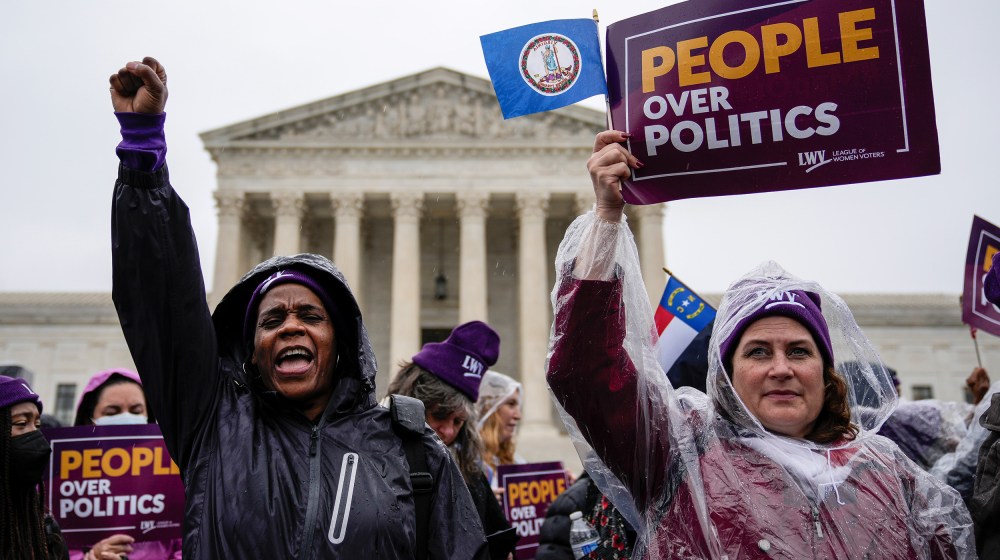After three hours of oral arguments Tuesday, three of the six conservatives on the Supreme Court appeared to be searching for a compromise in a case that, if some Republicans get their way, could allow state legislatures to burden our right to vote in federal elections with few safeguards to protect us.
State courts should be able to act as an ordinary constraint on lawmakers who violate their state constitutions.
The court heard Moore v. Harper, a North Carolina dispute over whether state courts have the power to invalidate voting district lines drawn by a state legislature if those lines violate the state’s Constitution. Some Republican lawmakers are pushing a theory called the independent state legislature doctrine. Based on a warped reading of the U.S. Constitution, the doctrine asserts that the responsibility of deciding the “time, place, and manner” of federal elections and how to appoint electors to the Electoral College (except in limited circumstances) belongs only to state lawmakers — the “legislature.”
Such a reading means “legislature” does not, in the vast majority of situations, include other members of state government. This despite the fact that we have always understood the word “legislature” to at least include other members of state government, like state courts. Under that theory, the legislature could violate its state’s constitution when making decisions about federal elections and state courts couldn’t do anything about it.
With Justices Clarence Thomas, Samuel Alito and Neil Gorsuch sounding like they’re OK with legislatures having broad power unreviewable by state courts, and Justices Sonia Sotomayor, Elena Kagan and Ketanji Brown Jackson appearing to espouse the view that, of course, lawmakers’ decisions are subject to review, it may be up to Chief Justice John Roberts and Justices Brett Kavanaugh and Amy Coney Barrett to broker a compromise that says state court judges still have some role to play when reviewing state lawmakers’ decisions about elections, but they can only go so far.
Even that compromise would be bad news for those of us worried about state lawmakers’ ability to burden the right to vote. Legally and practically, state courts should be able to act as an ordinary constraint on lawmakers who violate their state constitutions.
If, however, the Supreme Court accepts the broadest version of the independent state legislature theory, then state lawmakers will, with few exceptions, have exclusive power to make decisions about federal elections. Those decisions might involve whether there’s early voting, how many polling places there are and where, if voting by mail is allowed and even if the people’s vote for president should be accepted. The only others who could possibly weigh in would be federal judges, and then only if an issue of federal law arose.

If state lawmakers can draw their own district lines, without any fear of being overruled by state judges and with little fear of being overruled by federal judges, then the party in control of the legislature can gerrymander itself into victory and infringe on the power of our votes. That’s what happened in North Carolina. Its Supreme Court said lawmakers drew lines so lopsided they violated the state Constitution. Those pushing the independent state legislature theory have argued that even if the state’s highest court is right, it’s not in the court’s power to invalidate a redistricting map.
If the U.S. Supreme Court accepts this argument, then that could create problems for independent redistricting commissions in states such as California and Arizona. If only state lawmakers can draw legislative district lines, then that process cannot be outsourced to an outside, independent group.













